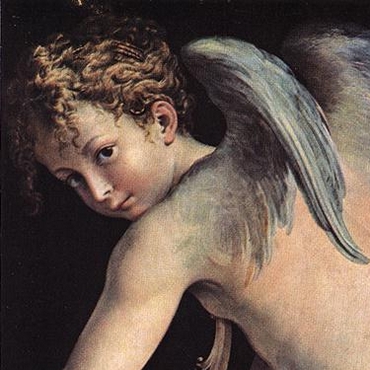
From time to time I especially suggest the song that I share on the post because I like it very much. I've never posted a song I didn't like at all, but there's a first time for everything. To make it even worse, I'm talking about a song that is considered among the best of this composer, Amor, by Strauss. Gosh, I’ve already said it: I can't stand Amor.
Why am I confessing now? You can blame the summer heat as I take it pretty badly and I always end up doing strange things. Anyway, I’ll tell you how it was: I was revising the two scheduled Strauss' Lieder until the end of the year in my blog's notebook and I realized that the two singers were a tenor and a baritone. I revised the previous nine posts and there were five baritones, two tenors and three sopranos. Strauss is supposed to be a soprano’s composer and my baritonophilia had betrayed me again! Then I wondered which Lied, sung by a soprano, I could choose and I thought of Amor. You see, the heat.
Let's start from the beginning. Between 1905 and 1917, roughly the period between Salome and Die Frau ohne Schatten, Richard Strauss didn't write Art Song. It seems that the reason wasn’t just his successful career as an opera composer; his wife and muse, the soprano Pauline de Ahna, had retired from stage and he didn’t have any inspiration, enthusiasm or interest in songwriting. It also seems that one of the reasons to go back to Art Song was his friendship with the young soprano Elisabeth Schumann, whom he first conducted in 1917. He wrote for her Sechs Lieder nach Gedichten von Clemens Brentano, op. 68, six songs clearly written in operatic style that can be related to different characters from Strauss' operas. Amor is the 5th song, and if you know Ariadne auf Naxos you'll easily recognize this song as Zerbinetta’s youngest sister: it's virtually a coloratura aria. Here is where my problems with this Lied begin, because I don't like coloratura very much; in an opera, within a context, if they don’t last too long, I can bear them, but Amor is a show of vocal pyrotechnics that doesn't suit my taste, what can I do?
Brentano's poem is quite charming and suits the composer: Cupido is playing near the hearth and his wings are set on fire; he cries and rushes to hide himself underneath the skirt of a shepherdess; she helps him to put out the fire, but, of course, from that very moment her heart is burning... Cupido, you naughty boy! The ornamentation of the song has to do with the games and the laughing of the Cupido at first and with his cries and the flames later, but still...
Although I don't like the song, I suggest a very good version: Diana Damrau and Christian Thielemann conducting the Münchner Philharmoniker (Strauss orchestrated this Lied in 1940 to his third soprano, muse Viorica Ursuleac). I hope you like it. And if you don't, please let us know, I'll feel better.
This is the August last post; next week we are starting a new season and I hope it won’t be that hot so I’ll be able to write a regular post. There will be at least one change though: from now on, I'll be posting every Wednesday instead of every Thursday.
An dem Feuer saß das Kind
Amor, Amor
Und war blind;
Mit dem kleinen Flügel fächelt
In die Flammen er und lächelt,
Fächelt, lächelt, schlaues Kind!
Ach, der Flügel brennt dem Kind!
Amor, Amor
Läuft geschwind!
„O wie ihn die Glut durchpeinet!“
Flügelschlagend laut er weinet;
In der Hirtin Schoß entrinnt
Hilfeschreiend das schlaue Kind.
Und die Hirtin hilft dem Kind,
Amor, Amor
Bös und blind.
Hirtin, sieh, dein Herz entbrennet,
Hast den Schelmen nicht gekennet.
Sieh, die Flamme wächst geschwinde.
Hüt dich vor dem schlauen Kind!
Fächle, lächle, schlaues Kind!